|
|
|
Sort Order |
|
|
|
Items / Page
|
|
|
|
|
|
|
| Srl | Item |
| 1 |
ID:
192184
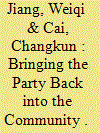

|
|
|
|
|
| Summary/Abstract |
While burgeoning research on China's state–society relations has paid attention to the Party, little is known about how the Party interacts with diverse actors and involves itself at the grassroots level in a specific region. This article delineates Party-advancement strategies at the community level in Shenzhen since 2013. To reclaim its leading role at the grassroots level, the Party opted for “Party–government disaggregation” by framing community governance as a Party-building affair, separating the government's affairs from those of the Party and “kicking” the government out of the community. Under the rubric of “reshaping Party–mass relations,” the Party penetrated deep into the community by innovating a “centre-periphery” organizational system, absorbing community elites in a top-down way and using a “service delivery taking the lead” method in a reciprocal exchange. In the end, the Party-governance structure, in which Party–mass relations are at the core, was reframed in the communities.
|
|
|
|
|
|
|
|
|
|
|
|
|
|
|
|
| 2 |
ID:
192180
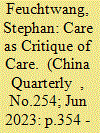

|
|
|
|
|
| Summary/Abstract |
Socialist governance and popular sovereignty require state administration of care. In the People's Republic of China (PRC) today, such state care is provided in the form of public services and in the guarantee of social security. Ideally, different levels of government should foster relations of care in local communities and remain responsive to “the people.” Local self-government, relations of mutual support and ritual communities, however, reveal the deficits of state care. Much like general philosophies of care, such local ethics of care propose universal benchmarks against which social practice can be measured. This article outlines the main contours of state care in the post-Mao Zedong PRC, and contrasts its findings with empirical research on public services, social security and ritual responsiveness. Mutual help, neighbourhood communities and ritual practice, in particular, provide alternative models of care. As such, they can be extended and universalized, and offer possibilities for a critique of care.
|
|
|
|
|
|
|
|
|
|
|
|
|
|
|
|
| 3 |
ID:
192178
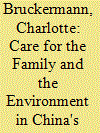

|
|
|
|
|
| Summary/Abstract |
In the “coal province” of Shanxi, residents grapple with tensions between caring for their families and caring about their environment. In creating ethical pathways through care, residents must navigate the paradox of livelihoods dependent on forms of development that endanger lives and pollute environments. This dilemma has crystallized over time, as the personal and particular demands of the present have become enmeshed with long-standing concerns over environmental degradation. Rather than characterizing family care as concrete and environmental care as abstract, acts of care in Shanxi link the reproductive crisis of the family with the reproductive crisis of the environment: the article presents instances under which the attention, empathy and recognition of care for concrete others are scaled up to the levels of ecology and planetary crisis.
|
|
|
|
|
|
|
|
|
|
|
|
|
|
|
|
| 4 |
ID:
192177
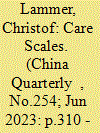

|
|
|
|
|
| Summary/Abstract |
Examining the “world's largest cash-based social policy” through the lens of care reveals widely shared scalar imaginaries and the productivity of care in constituting scale. In standardizing the minimum livelihood guarantee (dibao), officials, applicants and researchers in rural Sichuan cited both “too much” and “not enough” care at the scale of the family in recommending or rejecting state assistance. Different levels of organization (scale1) were not stable bases with specific sizes and qualities (scale2) that enabled or limited care. Dibao-related practices were evaluated as an appropriate (“filial piety”), insufficient (“individualism”) or excessive (“corruption”) amount of family care. Care became an indicator of kinship measurements and a marker of state boundaries. Thus, scale (in both meanings) was enacted in China, as elsewhere, through negotiations of needs and responsibilities, through evaluations of care practices and their outcomes. In this sense, care scales.
|
|
|
|
|
|
|
|
|
|
|
|
|
|
|
|
| 5 |
ID:
192181
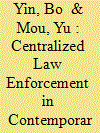

|
|
|
|
|
| Summary/Abstract |
In 2018, China's general secretary, Xi Jinping, announced a three-year war on “black societies and evil forces” and promised to take down various forms of organized crime and evil forces within society. This article examines the operational features of this particular crackdown and how they diverged from previous “strike hard” campaigns. This campaign adopted novel strategies including embedding instructions on law enforcement within criminal justice institutions, promulgating special rules on the crimes of evil forces in order to “strike” campaign targets early, and deploying intrusive investigation tactics that focused on the person and not the crime. Using democratic centralism as a liberal lens, this campaign showcases the struggle between the imperative of legality and the politics of a major campaign in China.
|
|
|
|
|
|
|
|
|
|
|
|
|
|
|
|
| 6 |
ID:
192187


|
|
|
|
|
| Summary/Abstract |
In China, celebrities can dominate public discourse and shape popular culture, but they are under the state's close gaze. Recent studies have revealed how the state disciplines and co-opts celebrities to promote patriotism, foster traditional values and spread political propaganda. However, how do celebrities adapt to the changing political environment? Focusing on political signalling on the social media platform Sina Weibo, we analyse a novel dataset and find that the vast majority of top celebrities repost from official accounts of government agencies and state media outlets, though there are variations. Younger celebrities with more followers tend to repost from official accounts more often. Celebrities from Taiwan tend to repost less than those from the mainland and Hong Kong, despite being subject to the same rules. However, the frequent political signalling by the most influential celebrities among younger generations suggests that the state has co-opted celebrity influence on social media to broadly promote its political objectives.
|
|
|
|
|
|
|
|
|
|
|
|
|
|
|
|
| 7 |
ID:
192185
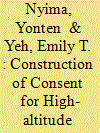

|
|
|
|
|
| Summary/Abstract |
In 2018, the Tibet Autonomous Region began resettling pastoralists from high-altitude areas to newly built settlements in distant, lower-altitude farming locations under the “extremely high-altitude ecological resettlement” programme, with a stated dual purpose of environmental protection and improving pastoralist well-being. The programme is said to be based on a principle of “government guidance and voluntary participation.” However, despite its stated “voluntary” nature, the government reports a 100 per cent rate of agreement to participate. After examining the ecological rationales for resettlement and pastoralists’ reluctance to move owing to livelihood concerns and attachment to homeland, the article examines how consent is achieved. Based on official documents and reports as well as semi-structured interviews with officials and pastoralists in Nagchu Municipality, the core target area for the programme, the article identifies a three-step “thought-work” oriented process – beginning with an initial survey, followed by group incentives and warnings and then individual incentives and warnings – which is deployed until pastoralists sign a resettlement agreement. The process illustrates the dialectical relationship between coercion and consent.
|
|
|
|
|
|
|
|
|
|
|
|
|
|
|
|
| 8 |
ID:
192176
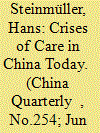

|
|
|
|
|
| Summary/Abstract |
The introduction to this special section presents an overview of crises of care in China today, specifically as they affect the fields of kinship, health and government. To study care ethnographically, we distinguish between the attentive and active dimensions of care: what people care about, and how they care for others. Acts of care always relate to larger concerns and general values, but they scale up in different ways. The imbalances that emerge are central to the politics of care that our contributors describe. Care as attentive co-growth engages different values, remakes inequality and nourishes political life. The contributors use the same framework of attention, action and politics to investigate crucial issues in Chinese society, including family, health, environment, ritual and animals. In all these fields, care provides a privileged vantage point from which to understand social and moral change in China today.
|
|
|
|
|
|
|
|
|
|
|
|
|
|
|
|
| 9 |
ID:
192183


|
|
|
|
|
| Summary/Abstract |
For decades, funeral reform has been a key concern for cultural governance in China as the state has attempted to manage “feudal” and “superstitious” practices and economize resources such as land devoted to cemeteries. We analyse the status of funeral reforms in Shenzhen, combining general observations with a case study of an urban village. We show how the business of funeral service providers mediates between cultural governance and grassroots-level needs and demands, resulting in distinct forms of ritual hybridization. In the case of native villagers, we observe the bifurcation of rituals at the central municipal parlour and at the home of the deceased. For understanding the adaptability of death rituals under the regime of cultural governance, it is essential to distinguish between funeral rites and their modular structure on the one hand, and rites for the disposal of the body on the other.
|
|
|
|
|
|
|
|
|
|
|
|
|
|
|
|
| 10 |
ID:
192189


|
|
|
|
|
| Summary/Abstract |
Does local democracy induce better service to citizens? While elected officials can be punished at the ballot box if they fail to address citizens’ needs, appointed bureaucrats may have policy knowledge that enables them to better serve citizens. Employing a multimethod design, this paper uses variation in local political institutions in Taiwan to assess the relative merits of direct election and bureaucratic appointment for local government responsiveness. While democratic institutions are often thought to induce responsiveness, I find that in Taiwan, with its historically strong bureaucracy and relatively new democratic institutions, the picture is somewhat more complicated. Elected and appointed officials face different incentives that motivate the latter to respond more quickly and effectively to online requests for help.
|
|
|
|
|
|
|
|
|
|
|
|
|
|
|
|
| 11 |
ID:
192175


|
|
|
|
|
| Summary/Abstract |
Ezra Vogel, the Henry Ford II Professor of the Social Sciences, Emeritus, at Harvard University, was one of the world's leading authorities on East Asia. In a career spanning more than 60 years, he published ground-breaking works on both China and Japan based upon detailed fieldwork, in-depth interviews and documentary research, using near-native fluency in both languages. He established a distinguished record in public policy advocacy, promoting better relations between the United States and rising East Asian powers, and among those powers. He also played a leading role in organizations dedicated to promoting better understanding of Asia.
|
|
|
|
|
|
|
|
|
|
|
|
|
|
|
|
| 12 |
ID:
192182
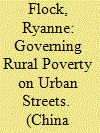

|
|
|
|
|
| Summary/Abstract |
This study investigates how discourses on panhandling intertwine with the governance of beggars on China's urban streets. It focuses on local policy implementation in Guangzhou city, led by the bureau of civil affairs along with its centres for “custody and repatriation” and “assistance stations.” The study aims to understand how the state regulates panhandling and engages with beggars in public spaces. Exploring the internal logic of the state's approach and how it has changed during the 40 years of reform, it also considers the junctures at which contradictions and conflicts arise. Based on fieldwork data (2011 to 2014) and the analysis of government documents, yearbooks, academic and mass media discourses, I argue that the state's treatment of panhandlers poses a conundrum as welfare measures conflict with control. While several layers of state regulation and actors contradict each other and create grey areas of state-induced informality, people who beg for alms are continuously criminalized and excluded from public space.
|
|
|
|
|
|
|
|
|
|
|
|
|
|
|
|
| 13 |
ID:
192188


|
|
|
|
|
| Summary/Abstract |
This research report measures changes in China's public diplomacy after a May 2021 collective study session of the Chinese Communist Party Politburo. The session examined the country's global communications strategy and fuelled speculation about what might change in China's external communications, particularly with regard to its “wolf warrior” diplomats. Combining hand-coding and quantitative text analysis, we develop and validate a measure of “wolf warrior diplomacy” rhetoric and apply it to over 200,000 tweets from nearly 200 institutional, media and diplomatic Twitter accounts. Using a difference-in-difference research design, we evaluate if the session led to a noticeable change in the tweets of diplomats based in OECD countries. After the announcement, PRC diplomats in the OECD moderated their tweets in comparison to non-OECD diplomats, but we do not detect a major re-orientation of PRC communication strategies. These findings have relevance for scholars of Chinese foreign policy, nationalism and public diplomacy.
|
|
|
|
|
|
|
|
|
|
|
|
|
|
|
|
| 14 |
ID:
192186


|
|
|
|
|
| Summary/Abstract |
China's criminal proceedings have been recognized as being “investigation centred.” I argue that the rise of the Plea Leniency System has led to “prosecution centredness.” Analysis of the operation and consequences of plea leniency shows how the procuratorate has overshadowed the police and further marginalized the courts. In plea leniency, the defendant has little chance of being acquitted and the legal profession provides little defence. While this paradigm shift signals further leniency in criminal justice, rights protections make way for efficiency and crime control. As such, plea leniency has profound implications for the operation of the criminal justice apparatuses, defendants, defence lawyers, and the mode of crime control in China.
|
|
|
|
|
|
|
|
|
|
|
|
|
|
|
|
| 15 |
ID:
192179
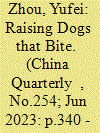

|
|
|
|
|
| Summary/Abstract |
Tibetan pastoralists have long been using dogs as guards. Since the late 1980s, the same dogs, called “Tibetan Mastiffs,” have become valuable pets for Han Chinese consumers. This paper discusses how commodification transforms the value of these dogs, and the care relationship between humans and dogs. Tibetan pastoralists and dogs participate in a reciprocal yet distanced care relationship through raising and guarding, which is not confined to a pursuit of dogs’ ferocity. In contrast, a taste for ferocity prevails in the Tibetan Mastiff market, and breeders care for dogs in a more dedicated, and yet more unilateral and dangerous, way. The unintended consequence of breeders’ care is that they raise dogs that sometimes bite; this is explained based on a process of value transformation in dogs’ guarding abilities, from ethical virtue to commercial price.
|
|
|
|
|
|
|
|
|
|
|
|
|
|
|
|
|
|
|
|
|